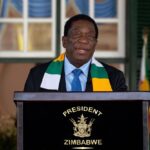HARARE – The Zimbabwean political landscape is once again shrouded in a cloud of suspicion and controversy, this time with the Zimbabwe Electoral Commission (ZEC) at the heart of a scandal that threatens to undermine public trust in the country’s electoral processes. Allegations of massive fraud, involving over US$100 million in public funds, have emerged, casting a dark shadow over last year’s controversial elections.
The scandal revolves around a series of tenders awarded to South African company Ren-Form CC and its local agents, including Better Brands Security (Pvt) Ltd, for the supply of electoral materials. The accusations are stark: prices were inflated by as much as 235%, with the ZEC allegedly paying exorbitant sums for items like biometric voter registration (BVR) kits, canvas tents, ballot papers, solar lights, and indelible ink marking pens.
The scale of the alleged financial mismanagement is staggering. Initial reports suggested a US$40 million deal for BVR kits and related services, but new evidence reveals a much larger sum – US$69 million – was paid to Ren-Form CC. This figure, coupled with an additional US$21 million spent on other election materials, including donations, brings the total expenditure to a staggering US$90 million.
The ZEC’s records, however, paint a different picture. They indicate that a total of US$21,148,867 was spent on importing election materials, including donations. This discrepancy alone raises serious questions about the transparency and accountability of the ZEC’s financial dealings.
The payments include the following amounts:
- US$2,673,360
- US$4,919,592
- US$8,964,693.80
- US$3,544,526
- US$4,025,559
- US$4,126,500
- US$4,786,800
- US$5,000,000
- US$4,989,325.50
- US$3,946,626.50
- US$5,731,979.50
- US$5,907,123.30
- US$5,992,334
- US$4,513,218
Further adding to the controversy are the ZEC’s purchases of 2,000 non-flushable toilets at a cost of US$7.6 million. This equates to a price of US$3,800 per toilet, a figure that is significantly higher than the retail price of around US$300 in South Africa. The toilets, curiously, were delivered eight months after the elections, raising further concerns about the timing and necessity of the purchase.
The ZEC also spent US$5 million on gadgets to display voting returns and digital V11 polling station forms, which were similarly delivered months after the elections. This raises questions about the ZEC’s procurement processes and the potential for deliberate delays in the delivery of essential election materials.
The allegations of fraud have implicated several high-profile individuals, including ZEC chairperson Priscilla Chigumba, chief electoral officer Utloile Silaigwana, and chief procurement officer Robson Changachirere. Businessmen Wicknell Chivayo, Moses Mpofu, Pedzai “Scott” Sakupwanya, and Mike Chimombe are also named in connection with the scandal.
Adding to the intrigue are the names of high-ranking officials such as Central Intelligence Organisation Director-General Isaac Moyo, Chief Secretary to the President and Cabinet Martin Rushwaya, lawyer Everson Chatambudza, Ren-Form international sales executive Angus Carlaw, and the company’s chief executive Thomas Michel du Sart. Their alleged involvement in the scandal has sent shockwaves through the political establishment, raising serious concerns about the potential for corruption at the highest levels of government.
In the 2023 national budget presented in November 2022, Finance Minister Mthuli Ncube allocated ZW$76 billion (US$116 million at the time) for the elections. The alleged US$100 million fraud, if proven, would represent a significant portion of this allocation, highlighting the scale of the financial mismanagement that has taken place.
The scandal has ignited a firestorm of criticism and calls for accountability. Opposition parties, civil society organisations, and independent observers have expressed deep concerns about the integrity of the electoral process and the potential for manipulation. They have demanded a thorough investigation into the allegations, calling for the prosecution of those found guilty of corruption and the implementation of reforms to prevent such scandals from recurring.
“This is a serious indictment of the ZEC and the government as a whole,” said a political analyst Dumisani Moyo. “It raises serious questions about the credibility of the elections and the commitment to democratic principles. The government must act decisively to address these allegations and restore public confidence in the electoral process.”
The ZEC, for its part, has denied any wrongdoing, claiming that all procurement processes were conducted in accordance with established procedures. However, the weight of evidence against them is substantial, and the public is demanding answers.












